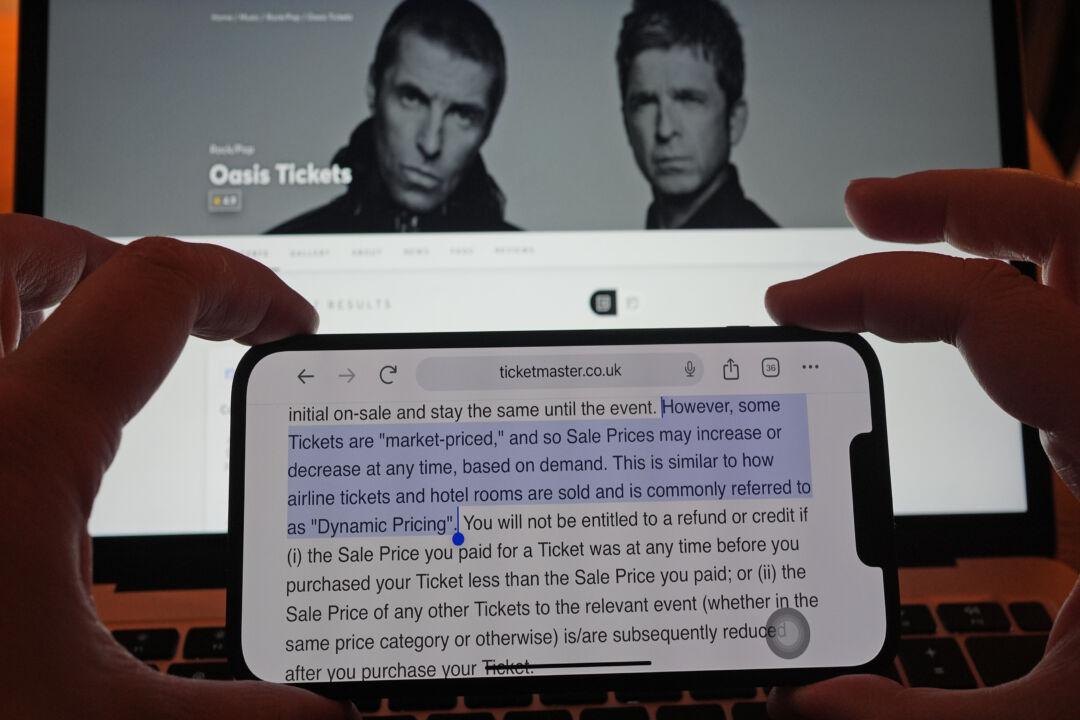The Competition and Markets Authority (CMA) has said it is “urgently reviewing” the ticketing market, following the controversy over the dynamic pricing for Oasis tour tickets.
The regulator will work with government ministers to ensure that consumer law is being followed and fans “get a fair deal when they buy tickets.”
Following the announcement by the iconic Britpop band of their reunion tour next year, fans rushed to seller websites on Aug. 31 to purchase tickets. Owing to high demand, standard tickets on Ticketmaster more than doubled from £148 to £355.
“The CMA is urgently reviewing recent developments in the ticketing market, including the way dynamic pricing is being used in the primary market,” a CMA spokesperson said.
“Consumer protection law requires businesses to be fair and transparent in their dealings with consumers, and businesses must give clear and accurate information about the price people have to pay. Failure to do so may breach the law.”
The price of tickets on Ticketmaster can change based on demand. Disappointed fans turned to the Advertising Standards Authority (ASA), which received 450 complaints about Ticketmaster adverts for the Oasis concerts.
The CMA said consumers need more protections and called on the government to adopt the necessary changes.
Government Response
The rise in Oasis ticket pricing prompted the government to include dynamic pricing in its forthcoming consultation on consumer protections for ticket resales, also known as ticket touting.Speaking on Sunday, Culture Secretary Lisa Nandy said the government will look into “issues around transparency and use of dynamic pricing, including the technology around queuing systems which incentivise it.”
“Working with artists, industry, and fans we can create a fairer system that ends the scourge of touts and rip-off resales, and ensures tickets at fair prices,” she said.
On Monday, Prime Minister Sir Keir Starmer told BBC Radio 5 Live that the government will get a “grip” on the issue of surge pricing.
“I do think there are a number of things that we can do and we should do, because otherwise you get to the situation where families simply can’t go, or are absolutely spending a fortune on tickets, whatever it may be,” he said.
Leisure Industry
The surge in prices for Oasis’s tour tickets could have a “huge impact” on the leisure industry, restricting family budgets and leaving consumers less room to attend multiple entertainment activities, a resale site director has claimed.The director of partnerships at TicketSwap, Oscar Kriek, said, “The impact is bigger than just this one event, because if these very popular events are implementing these kind of pricing strategies, it means that there’s less room for other events, because the consumers can only spend a specific amount of money once.”
This will leave less room for consumers to spend on other leisure experiences throughout the year, such as concerts and festivals, he added.
According to Ticketmaster, event organisers price tickets according to their market value.
Sellers usually charge a service fee or take a percentage from the sales, but the main split is between the promoters and the artist, Kriek explained.
The promoters for the long-awaited Oasis reunion tour include Manchester-based SJM Concerts, Irish MCD, and Scottish DF Concerts & Events.
“Usually, how it works with a concert tour is that the promoter sells the ticket and there’s a split between the promoter and the band, so the band will get a percentage of the selling price of the ticket, so that’s the face value, but in this case, it would be the dynamic pricing,” Kriek said.
“The eventual ticket price will be split with the percentage that’s in the agreement between the promoter and the band. So the band will definitely see something from that additional revenue,” he said.
His website TicketSwap caps sales at 20 percent above the original price. Kriek said it was a “shame” that Oasis ticket sales had been handled in a way that created a negative experience for consumers.
“I hope that we learn from them as an industry, because we want to prevent these things … because it has such an impact on the entire industry. We are very much for a more fair and a safer ticketing ecosystem, and we need everyone within the industry,” Kriek said.







